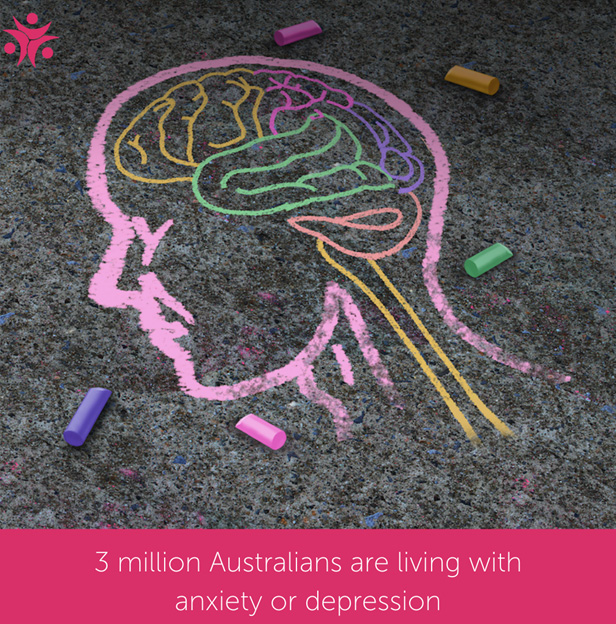Make an Appointment
Mental health is a hot topic these days, but that hasn’t always been the case. Many people put more importance on their physical health as opposed to their mental health but we’re learning now that they should both be equally prioritised.
Let’s dive into what mental health is, what some symptoms of mental illness are, and tips to maintain your mental well-being.
What is mental health?
Often, people assume mental health is simply the absence of mental illness when, in fact, mental health is about so much more. Think about it in a physical sense.
Just because you don’t have an illness, does that necessarily mean you’re healthy? Of course, not. The same goes for our mental state.
Mental health is a mode in which you’re living your life in positive and meaningful ways as well as your ability to manage life’s ups and downs.
However, in some cases, you may be suffering from a debilitating mental illness making it harder to promote good mental health and these illnesses should not be discounted.

Mental Illness – Symptoms and Causes
Some of the most commons forms of mental illness are separated into two categories: depression and anxiety. Often, sufferers experience both and since there’s still quite a lot of stigma surrounding mental disorders, it can be tough to find relief.
We all feel down sometimes and feeling sad is completely normal and necessary. But some people have depression which means they have prolonged periods of intensely low moods for weeks, months, or years at a time.
Depression can be caused by a major life event, family history, serious medical diagnoses, and many other factors. Common symptoms of depression include:
- Withdrawing from family and friends
- Apathy for things you once enjoyed
- Inability to concentrate
- Using drugs or alcohol excessively
- Feelings of guilt, irritation, low self-esteem, frustration, disappointment, misery, and sadness
Anxiety, on the other hand, is characterized by extreme worry, fear, and stress. In short, anxiety is your fight or flight response persisting even after the “stressor” has been removed.
Again, everyone feels anxious from time to time but when your anxiety makes it hard to cope with your everyday life, you could have a generalised anxiety disorder.
Anxiety is the most common mental illness in Australia according to Beyond Blue affecting nearly one in four people. Some signs that you might be experiencing anxiety are:
- Panic attacks, hot and cold flashes, racing heart, heavy breathing, restlessness, edginess
- Excessive worry, fear, or obsession
- Avoidance of situations in which you might become anxious in a way that affects your social life or your work
Other types of mental illnesses include eating disorders like anorexia , bulimia and schizophrenia, however many of these issues have roots in depression and anxiety.
If you’re concerned that you might be experiencing a mental illness, seek support from a mental health professional right away.
Visit Your Health In Mind is a great website to start. From mental health support telephone services to fact sheets and information, There website provides expert information about mental illness, treatments, psychiatrists, and how to get help.
It's written in plain English, based on the best available evidence. It's especially for Australians and New Zealanders.
Our Tips for Good Mental Health
Even if you don’t struggle with a mental illness, you could still might have poor mental health. Improving your mental health helps instill better habits, curb unhelpful thought patterns, and contributes to the prevention of possible more serious mental health disorders down the track..
Foster Relationships
Although it may feel like it sometimes, we are never alone. As human beings, we’re not meant to flourish without the support of others, whether in the form of family members, friends, or your wider community.
Meet up with people in your circle face-to-face more often and see how much your mental health improves.
Exercise and Eat Well
Exercise has immense benefits when it comes to mental well-being. It boosts those “feel-good” hormones and as our bodies feel physically stronger and we see ourselves improving, our mental health is strengthened as well.
Check out some ripper pieces of blog posts we’ve done in the past to help kickstart exercise routines
10 simple exercises you can do to kick-start your fitness journey
Free weights or machine weights? What works best?
Why is it important to make cross training part of your exercise routine?
Eating nutritiously also contributes to better mental health for the same reason – our physical bodies and mental state are connected. So, avoid excess sugar and alcohol, drink plenty of water, and eat whole foods.
Need some extra Nutrition advice? We’ve got you covered, check out some recent blogs we’ve done covering everything to do with nutrition.
Everything you need to know about the top diet trends in 2019
Practice Gratitude
It’s so easy to get caught up in what we don’t have. It can spiral into a pattern of negative thinking which can turn into life-long habits of feeling down on ourselves. Instead, practice gratitude for all the things you do have, especially when times are tough.
It doesn’t mean that the downers in life don’t suck. You can be sad when things are hard. You’ll just likely react with more grace if you practice gratitude.
Don’t Compare
Comparing ourselves to others is one of the worst things we can do for our mental health. We all have different strengths and weaknesses so it’s important to play to your strengths and avoid focusing on what you’re not-so-good at. We’re all beautifully unique so it’s important not to try to be anyone else.
Express Yourself
Figure out a way to express yourself and do more of it. Whether it’s through music, dance, painting, writing, sports, or a plethora of other expressive activities, it’s good for your mental health to have an outlet when you’re feeling low.
Spend Time in Nature
Studies have shown that simply walking in nature improves anxiety levels and if you’ve tried it yourself, you won’t need a study to convince you. Simply getting your blood moving, breathing in the fresh air, and taking some time to notice the world around you can do wonders for your mental state.

Set Small Goals and Meet Them
Sometimes, we set too lofty of goals and when we fail to meet them, it can leave us feeling worse than when we started. So, start small.
It can be as simple as making your bed, doing the washing, drinking a liter of water, or going for a walk every day this week. Telling yourself you’ll do something and then following through, even if it’s something small, makes a world of difference.
Seek Help
If you’ve tried it all and you need more tools to cope, seek help from a mental health professional. Not only do therapists offer a third-party perspective, but they also offer tools that can help identify destructive patterns that we may not even recognise.
As mentioned before, Beyond Blue is an excellent resource and reference for anybody battling with their mental health. With an estimation of 3 million Australians living with anxiety or depression, Beyond Blue provides plethora of information and support to help everyone in Australia achieve their best possible mental health, whatever their age and whenever they live.
At Physio Inq, we can help get you on an exercise plan to promote mental health, boosting your mood and improving everything you do. Exercising properly is so important and we’re passionate about helping you be the best you can be.
Our Exercise Physiologists can assist to help you get the most out of your life. Our Accredited Exercise Physiologists are university qualified allied health professionals equipped with the expertise, skills, and capacity to design, deliver and evaluate safe and effective exercise and programs to improve, prevent, manage and treat complex medical conditions.
We have a number of Exercise Physiologists based in some of our Physio Inq clinics and mobile services across Australia.
If you prefer to have one of our Physio Inq Exercise Physiologists to rock up at place and time that suites you, why not book into see one of our mobile/home Exercise Physiologists who can run you through your exercise program in the comfort of your own home or workplace
Book an appointment online today!
Date Published: Tuesday, December 29, 2020
Need to get into direct contact with ur Client Services team? We're all ears. Call our team directly on 1300 731 733
